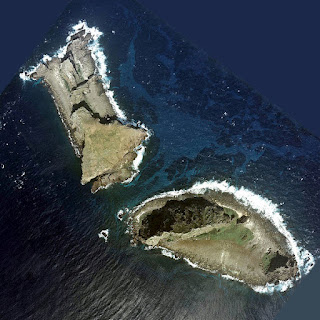Everyone
would love to own an Island. In Japan’s case, the country is looking to own
quite a few in the East China Sea and Sea of Japan, and is having no luck in
convincing its East Asian neighbors that it legally can. Recent disputes with
South Korea, China, and Taiwan have been dominating Asian headlines as the
already island-wealthy nation tries to assert its ownership over the
Dokdo/Takeshima islands as well as the Diaoyu/Senkaku islands. The disputes are
complex due to the fact that they are not only based on historical significance
and regional relationships but also economic concerns. If they are not
resolved, or at the very least if the countries involved do not stop inflaming
tensions over them, then the East Asian arena could explode in a way the region
has not seen since World War II.
Dokdo/Takeshima. Photo by 머찐만두.
The
Dokdo (South Korea)/Takeshima (Japan) disagreement has playing out between
Japan and South Korea for more than a century. Japan brutally occupied South
Korea from 1910-1945, only to be forced out by the loss of World War II. While
in control of the country Japanese soldiers raped South Korean women, using
them as “comfort women” or prostitutes in military brothels. The comfort women clash
tends to be the most frequently cited issue remaining from the occupation
today. With Japanese withdrawal from South Korea in 1945 did not come Japanese
recognition of South Korea’s sovereign rights to the islands, a fact that South
Koreans claim illustrates their continued humiliation of South Korea. While
having officially apologized for the occupation on several occasions, Koreans
feel Japan is not sincere in their regret of the occupation years. South
Koreans have created a national culture around Dokdo: they celebrate Dokdo day,
learn about the islands in their schools, take regular trips or pilgrimages to
the islands, and even have a textbook written about them.
Japan,
for its part, wishes to turn the case over to international arbitration in the
International Court of Justice. ICJ rules state that both parties must agree to
such arbitration, and South Korea refuses to do this based on the fact that it
would undermine their claim that they already own the islands. South Korean
presidents historically have used the row to draw upon nationalist sentiments
to boost their own popularity. It seems to be working: Pres. Lee Myung-bak
visited the islands on 10 August, which resulted in the Japanese envoy in Seoul
being temporarily withdrawn but his approval ratings to jump.
South
Korean citizens are proud to flout the Japanese claim of ownership as well.
Besides making trips to the islands, on the anniversary of the country’s
liberation 40 swimmers swam to the islands. Another man rammed his truck into
the gates of the Japanese embassy in Seoul in protest. Still others have cut
off their fingers and sent them to Japanese officials. At the London Olympics,
in a move that particularly raised tensions, a victorious South Korean soccer
player held up a sign reading “Dokdo is our land” after the South Korean team
beat Japan in the bronze medal match.
The
posturing between the two nations has much more to do with historical
nationalist issues than commercial gains, but there are valuable fishing areas
in the surrounding seas. Gas reserves also may be located nearby, but the
amount of gas they contain is unknown. South Korea controls the islands with a
small force of National Guard troops stationed there. The dispute threatens
relations between the two normally friendly countries, and jeopardizes their
roles as bulwarks against an isolated North Korea.
Japan
may decide that it is in its interests to drop its claim despite the domestic
fallout such a move would entail. It is already involved in a much more
acrimonious and potentially dangerous argument with China over the Diaoyu
(South Korea)/Senkaku (China) islands that are located in the East China Sea
and known to have what may prove to be a vast natural gas reserve nearby. The
islands are also close to strategic shipping lanes and fishing areas. Currently
a Japanese private citizen owns the islands, but according to Japan a deal has
been met for the country to purchase them. China, however, claims that the
ownership is illegitimate because the islands have always belonged to the
Chinese. Japan officially controls them but China sent patrol ships to the
islands today, which infuriated Japanese officials.
Domestically,
the nations are being pushed to continue to fight for the islands. Uncertainty
about China’s future makes the country anxious to control as many natural
resources as it can. Upcoming changes in top leadership coupled with concerning
forecasts that the economy’s growth is beginning to slow have led to high
tensions within China. Japan’s current administration is quite weak
domestically and as such strong nationalist elements have been able to gain a
place in the forefront of politics. History also plays a role, as Japan
occupied China in the 1930s and 1940s in the same brutal fashion it did South
Korea. Taiwan further complicates the issue by asserting that it owns the
islands.
Whoever
ends up owning either set of islands will both win and lose. Domestically,
whichever government comes out on top will see a temporary boost in popularity.
Regionally and internationally, however, it is clear that the disputes are
harming the nations’ ability to work together to weather the storm of economic
downturn and avoid future conflicts that could turn violent. In this sea of
disputes, it becomes impossible to identify the clear solution. Yet recalling
the events of the early 20th century, the results of overzealous
nationalism, and the human lives such a stance ended up costing is ample reason
to find a compromise.


Hey Vicky - Any ideas on what a compromise might look like in each case?
ReplyDelete